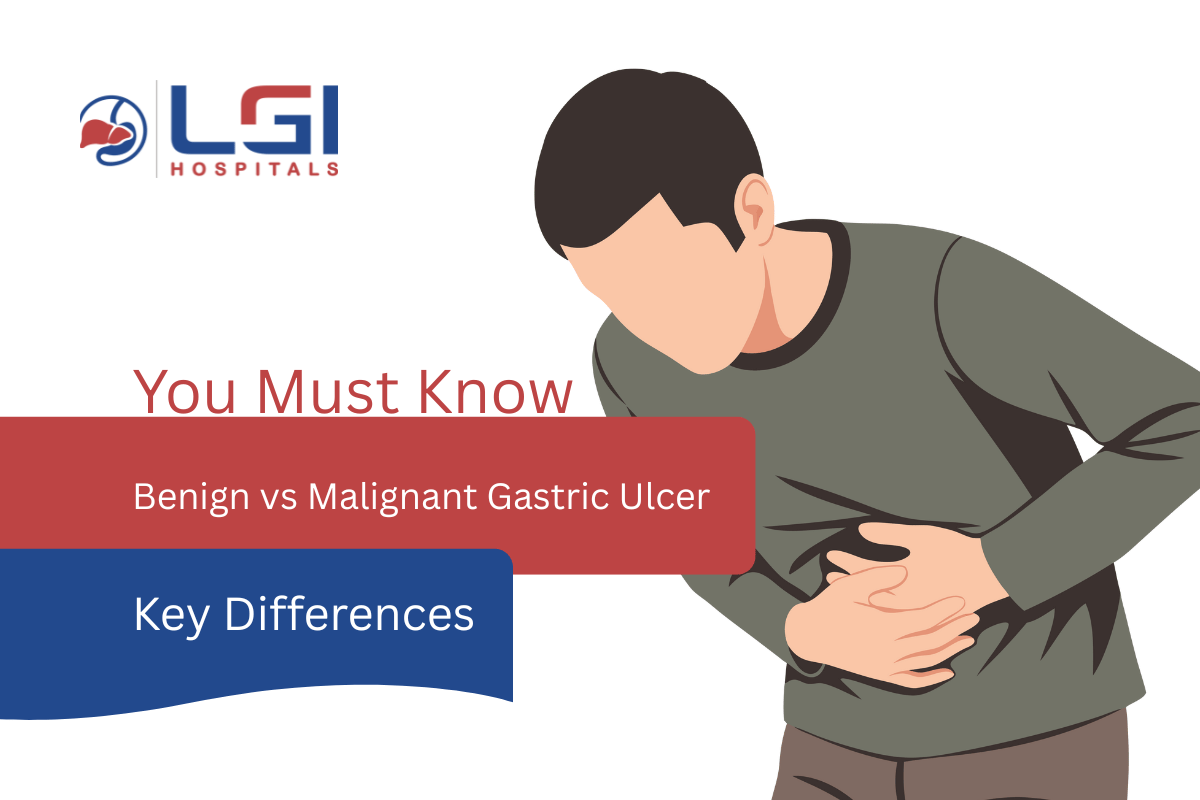When it comes to gastric ulcers, understanding the difference between benign vs malignant gastric ulcer is crucial. A benign gastric ulcer is non-cancerous and can usually be treated with medicines and lifestyle changes, while a malignant gastric ulcer is cancerous and linked to stomach cancer (gastric carcinoma).
Many patients confuse stomach ulcers with gastric cancer, which delays proper treatment. In this blog, we’ll explore the key differences between benign and malignant gastric ulcer, their symptoms, causes, diagnosis, and treatment options, so you can recognize the warning signs early.
What is a Benign Gastric Ulcer?
A benign gastric ulcer is a non-cancerous sore in the lining of the stomach. It is one of the most common gastric ulcer types and is usually caused by:
- Excess stomach acid production
- Helicobacter pylori (H. pylori) bacterial infection
- Long-term use of NSAIDs (painkillers like ibuprofen, aspirin)
- Smoking, alcohol, and unhealthy eating habits
With proper benign gastric ulcer treatment such as antibiotics, acid-reducing medicines, and dietary changes, these ulcers usually heal completely.
What is a Malignant Gastric Ulcer?
A malignant gastric ulcer is cancerous and occurs due to abnormal, uncontrolled growth of cells in the stomach lining. Unlike benign ulcers, these do not heal with routine medications and are a sign of stomach cancer.
Malignant ulcers often have:
- Irregular, thickened, raised edges (seen on endoscopy)
- Continuous symptoms despite medical treatment
- Potential to spread (metastasize) to other organs
Early malignant gastric ulcer diagnosis is critical because the survival rate increases significantly with timely detection and treatment.
Benign vs Malignant Gastric Ulcer: Key Differences
| Factor | Benign Gastric Ulcer | Malignant Gastric Ulcer |
| Nature | Non-cancerous | Cancerous (linked to stomach cancer) |
| Cause | Acid, H. pylori, NSAIDs | Cancerous cell growth |
| Healing | Heals with treatment | Does not heal with medicines |
| Pain Pattern | Often improves after food/antacids | Persistent, severe, worsens over time |
| Symptoms | Burning pain, bloating, nausea | Weight loss, appetite loss, blood in vomit/stool |
| Complications | Rare, manageable | Life-threatening if untreated |
This benign vs malignant gastric ulcer comparison shows why it’s so important to differentiate between the two for proper treatment.
Symptoms of Benign vs Malignant Gastric Ulcer
Benign Gastric Ulcer Symptoms:
- Burning pain in the upper abdomen
- Indigestion and bloating
- Relief with antacids or food
- Occasional nausea
Malignant Gastric Ulcer Symptoms:
- Persistent stomach pain not relieved by medicines
- Unexplained weight loss
- Loss of appetite (especially for heavy foods or meat)
- Vomiting blood (hematemesis)
- Passing black stools (melena)
- Chronic fatigue due to anemia
If you are experiencing gastric ulcer symptoms for more than 2 weeks, consult a gastroenterologist at LGI Hospitals immediately.
Causes and Risk Factors
Benign Gastric Ulcer Causes:
- H. pylori infection
- Long-term NSAID use
- Stress and poor lifestyle choices
Malignant Gastric Ulcer Causes:
- Chronic H. pylori infection leading to cancer
- Smoking and alcohol abuse
- Diet rich in smoked, salted, or processed foods
- Family history of gastric cancer
- Age above 50
Diagnosis of Benign vs Malignant Gastric Ulcer
To differentiate between benign vs malignant gastric ulcer, doctors recommend:
- Upper GI Endoscopy – To visually check the ulcer
- Biopsy – To confirm cancerous cells in malignant ulcers
- CT Scan / MRI – To see if cancer has spread
- Blood Tests – To detect anemia and H. pylori infection
Treatment Options
Benign Gastric Ulcer Treatment:
- Antibiotics for H. pylori infection
- Antacids and proton pump inhibitors (PPIs)
- Lifestyle modifications – avoiding smoking, alcohol, and junk food
Malignant Gastric Ulcer Treatment:
- Surgery (partial or complete removal of the stomach)
- Chemotherapy to destroy cancer cells
- Radiotherapy for advanced cases
- Nutritional support during treatment
LGI Hospitals – Expert Care for Gastric Ulcers
At LGI Hospitals, we offer advanced treatment for both benign and malignant gastric ulcers, utilizing world-class technology and a team of experienced gastroenterologists and surgeons.
Our Expert Doctors:
- Dr. Prashant Bhandarkar – MD, DNB (Medicine), DM, DNB (Gastroenterology)
- Dr. Manoj A Vyawahare – MBBS, MD (Medicine), DNB (Medical Gastroenterology), Certificate in Clinical Research
- Dr. Yogesh A Bang – MBBS, MS (Gen Surgery), DNB (Surgical Gastroenterology), FMAS
With their expertise, LGI Hospitals ensures accurate diagnosis, effective treatment, and personalized care for patients with gastric ulcer symptoms.
The main difference in benign vs malignant gastric ulcer is that benign ulcers are non-cancerous and treatable, while malignant ulcers are cancerous and can be life-threatening.
If you notice persistent stomach pain, unexplained weight loss, or blood in vomit/stool, do not ignore it.
Contact LGI Hospitals today for expert diagnosis and treatment of gastric ulcers.

